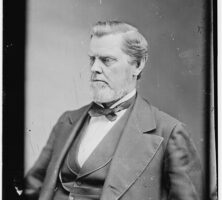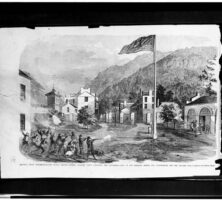A presence in Georgia state politics for more than three decades, Benjamin Hill was by turns a prosperous lawyer, opponent of secession, ardent supporter of the Confederacy, apologist for Reconstruction, and, at his death, Democratic U.S. senator from Georgia. Like his personal nemesis and fellow political survivor from the era, Joseph E. Brown, Hill manifested a remarkable political flexibility that was often taken for perfidy. Ben Hill County in south central Georgia was named for him upon its creation in 1906.

Courtesy of Library of Congress, Prints and Photographs Division
Born in Jasper County on September 14, 1823, Benjamin Harvey Hill matriculated at the University of Georgia and graduated in 1843. He then promptly gained entrance to the bar and nurtured a thriving law practice in LaGrange. Although he could be a political chameleon, Hill generally worked toward sectional comity. He thus entered public life as a supporter of the Union and the Compromise of 1850.
During a one-year term as a state representative from 1851 to 1852, Hill joined the short-lived Constitutional Union Party of Howell Cobb, Robert Toombs, and Alexander Stephens. Passage of the Kansas-Nebraska Act brought him back into politics as an independent in 1855, and he narrowly lost a seat in the state assembly to a Democratic stalwart in a heavily Democratic district. Two years later, the American Party nominated him as their gubernatorial candidate. He lost that race to the theretofore obscure Joseph E. Brown and retired from the political arena for another two-year interval.
John Brown’s raid on Harpers Ferry, West Virginia, in 1859 and the election of 1860 drew Hill once more onto the political battlefield. The events at Harpers Ferry gave fire-eaters throughout the South an unprecedented opportunity for agitation, and Hill emerged in Georgia as one of the leading voices of moderation. Following Abraham Lincoln’s election as president of the United States, Hill made an eloquent appeal to hold off on immediate secession to see what kind of leader Lincoln would prove to be. Such a policy, he argued, had the added benefit of allowing the South to prepare for a war, should one become inevitable. Nevertheless, when secession came, Hill reluctantly reconciled himself to it. Even in his new circumstances, he remained a committed nationalist. As a Confederate senator from 1861 to 1865, he aligned himself with the centralizing policies of Confederate president Jefferson Davis. His stance was made the more palatable because it antagonized Brown, who as a wartime governor clashed incessantly with Davis over the prerogatives of the states.

Courtesy of Library of Congress, Prints and Photographs Division
After a brief postwar imprisonment, Hill’s career entered its most controversial and ultimately most successful phase. Initially his actions followed the white Democratic Party line. He backed U.S. president Andrew Johnson’s lenient plan to bring the South back into the Union and later fought against the perceived excesses of congressional Reconstruction. Then in 1870 he took on the Bourbon Democrats, who were poised to “redeem” the state, in an extraordinarily brave plea that Southern whites recognize the Reconstruction amendments as a fait accompli and move on to other matters. This unpopular stance earned Hill a stint in the political wilderness. Having spent most of his lifetime backing losing causes, however, Hill ended his career on top, winning a seat in the U.S. Congress for Georgia’s Ninth District in December 1875. There he earned a national reputation as a champion of the white South by taking on such strident Radicals as James G. Blaine. Two years later he resigned from the House of Representatives to take a Senate seat, which he occupied until his death on August 16, 1882.






